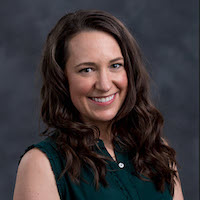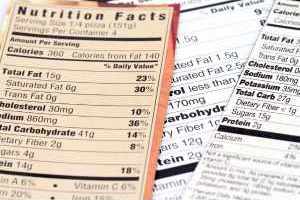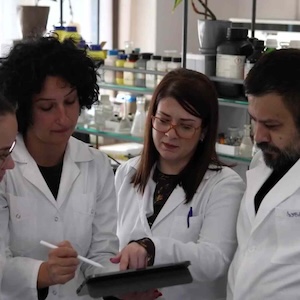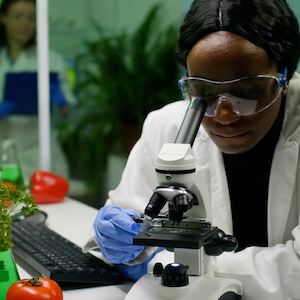Alexa Evenson, PhD, RDN, CFS, Regulatory Manager, Post Consumer Brands
Regulatory Affairs for Food Professionals Certificate student Alexa Evenson didn’t set out to work in food science. She started out as a kinesiology major and switched to nutrition and dietetics as an undergraduate at the University of Minnesota.
During an internship to become a dietitian, which included a four-month food service rotation, she became fascinated by recipe development. She returned to the U to earn a master’s degree in food science. She also worked as a dietitian, in long-term care, and in product development for Cargill.
Taking Knowledge from the Classroom to the Cafeteria
But there was more the first-generation college student wanted to accomplish. Alexa earned her PhD in Human Development and Education, taught classes in nutrition, and even developed her own class in product labeling. She eventually became a tenured professor in a small liberal arts college in Minnesota.
”I kind of missed industry,” she says of her recent move from academia to working at Post Consumer Brands in Lakeville. “It just seemed like the right time to make a transition back.”
Alexa’s journey to food regulatory affairs began in an introductory nutrition class. She later took a sports nutrition graduate class as a freshman and loved it. “I decided to switch from kinesiology to nutrition,” she says. “That seemed like a much better fit.”
Her interest grew during her dietetic internship, where she was more drawn to the food-focused work than the clinical dietetics. “I actually liked the nutrient analysis portion, playing with the different food products, and scaling it up.”
And she scaled it up in a big way as recipe developer for the Saint Paul School district. Alexa says “I was able to do everything—the ordering, procurement, recipe development, labeling, nutrition, and analysis for the district.”
Keeping Our Food Safe
In her current role as regulatory manager at Post, Alexa leads a team of three scientists who are responsible for much of the product labeling and for getting their products into stores. (Post Consumer Brands is home to cereals like Honey Bunches of Oats, Raisin Bran, and Grape Nuts, as well as pet foods like Nature’s Recipe, Pounce, and 9 Lives.)
“We do a lot of work with allergens, making sure we're on top of food safety, regulations, and informing consumers. We interface with cross-functional teams like sales and marketing, graphics, and consumer affairs.”
There is always new information out there to learn, she says. “That's one aspect that I know is important to me, continuously learning, which is one reason why I was a professor. But regulations change all the time. You need to know the updates that are coming.”
Alexa will soon be taking responsibility for Post Consumer Brand’s products that require Canadian labeling, and she’ll have to learn different international regulations.
“It’s important that our food is safe, nutritious, and labeled correctly,” she says. “As a dietitian, I worked with people who have diabetes or celiac for example, and it's important to know that it's gluten-free, or (that) an allergen exists in a product or monitor for cross-contamination. It’s important that products are labeled with the accurate amount of carbohydrates, for example, or vitamins and minerals for different health issues, including heart disease or kidney disease.”
A Field for Problem-Solvers
There are a lot of processes in place to keep consumers safe that go on behind the scenes. Naturally, though, consumers want companies to be transparent so that they can make informed choices about the food they buy.
“I do get a lot of consumer questions that are always interesting, like where do you source your strawberries or is your sugar organic,” Alexa says. “We do have to be mindful of why they are asking and what they would do with this information. Do you really understand the background if we tell you this? Are you going to take it out of context? Maybe it's a competitor. We never know what they would do with that information, but we're always honest and accurate, and provide information that is not confidential or proprietary to the company.”
Once the food is on the shelves, however, they may have little control over what the retailer says about their products on its website or newsletter. “There's always challenges and problem-solving on the fly. If you really like problem-solving, this is a good area to be in. There’s always something new.”
The Big Takeaway
“My biggest takeaway is how beneficial the experience of the professors is. (It) is so valuable, having someone who’s worked in the industry for 20, 30 years teaching the class. Even though I was a nutrition professor, there's so much you learn via experience and not in a textbook. I may have the skills to find the information, but they're immersed in it every day. They're going to know what's important. They're going to know what's best to teach. After teaching for so many years myself, I think that was something my students found valuable. I could talk about my counseling experience as a dietitian or product developer. That comes from doing the job.”
Mia Boos is a writer and content strategist with the College of Continuing and Professional Studies, covering the College’s graduate programs and undergraduate individualized degree programs. She joined the CCAPS Marketing team in 2014 and has worked for Thomson Reuters and New York University. Connect with her via LinkedIn.






